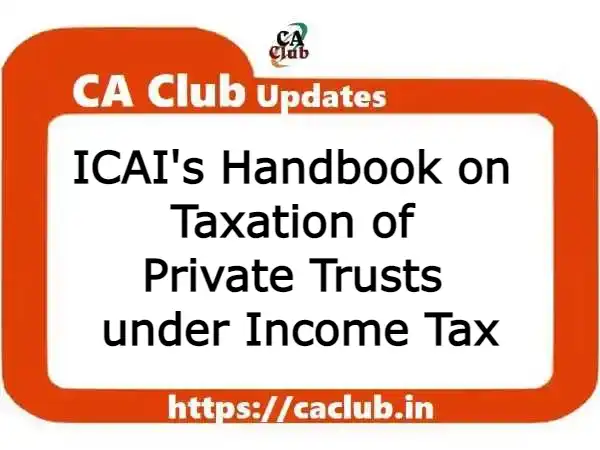Private trusts are a popular way to provide for family members and family businesses. Trust taxation is governed by separate laws, and understanding the law governing the taxation of income from private trusts is critical. The ICAI’s Direct Taxes Committee has published the “Handbook on Taxation of Private Trust of Income-tax Act, 1961,” which will assist members in effectively meeting their professional obligations related to taxation and related matters.
Taxation of Private Trusts
A Private Trust is an entity established by a Settlor in the name of specific beneficiaries, who are usually relatives or people with whom they have a social or economic connection. This trust is subject to the provisions of Sections 161 to 164 of the Income-tax Act 1961 and is a separate tax entity. The trustees retain control of the trust’s assets while providing benefits to the beneficiaries. As a result, understanding the law governing the taxation of income from private trusts is critical. The following are the main provisions of the Income-tax Act of 1961 that apply to the taxation of private trusts:
i) Section 161: This section states that anyone who receives income for which no one is assessable is subject to income tax at the maximum marginal rate.
ii) Section 162: This section states that a private trust must pay income tax in accordance with the provisions of the Income-tax Act of 1961.
iii) Section 163: This section states that the tax payable by a private trust on its income must be calculated in accordance with the provisions of the Act.
iv) Section 164: This section states that the income of a private trust must be calculated in accordance with the provisions of the Income-tax Act of 1961.
Income from trust property, income from investments, income from business, income from profession, income from other sources, capital gains, and agricultural income are all taxable in the hands of a private trust.
Classification of Private Trusts
There are two types of trusts: public trusts and private trusts. Public trusts are established to benefit the general public, whereas private trusts are established to benefit specific individuals. Specific trusts, family trusts, and business trusts are all types of private trusts. Sections 161 to 164 of the Income-tax Act 1961 deal with private trusts. Private trusts are gaining popularity as a way to provide for family members and family businesses. A separate set of laws governs trust taxation.
Private Trust and Family Trust Formation
Section 3 of the Indian Trust Act defines a trust as “an obligation annexed to the possession of the property and arising out of a confidence reposed in and accepted by the owner, or declared and accepted by him, for the advantage of another, or of another and also the owner.” In other words, it is simply the transfer of property from one person (the Settlor) to another (the “trustee”) who manages it for the benefit of another (the “beneficiary”). The Settlor must legally transfer ownership of the Trust’s assets to the trustee. Trusts are created to provide legal protection for the settlor’s property and to ensure that assets are distributed to beneficiaries in accordance with the settlor’s wishes. A trust can be used to specify how a person’s property should be managed while they are still alive or after they die.
Historically, trusts were mostly used to protect real estate, but their applications have grown significantly over time. Trusts are now used for corporate reorganisation, fund formation, and are becoming increasingly important in individual tax and succession planning. Private trusts are created for the benefit of a person’s family, friends, and relatives and are legally binding on the beneficiaries. Private trusts give transactions legal form, ensure that assets or properties are only used for the benefit of designated beneficiaries, and the trustee manages them as desired.
The ICAI’s Guidelines on Private Trust Taxation
The ICAI guidelines on private trust taxation are a valuable resource for chartered accountants and other tax professionals who work with trusts. The guidelines provide a comprehensive overview of the provisions of the Income-tax Act 1961 that govern private trust taxation.
The guidelines cover a wide range of topics, including the formation and registration of private trusts, the tax implications of different types of private trusts, calculating taxable income for private trusts, and the Income-tax Act compliance requirements for private trusts.
Furthermore, the guidelines provide practical guidance on how to prepare and file private trust tax returns, comply with reporting requirements, and deal with tax audits and other compliance issues. The guidelines are updated on a regular basis to reflect changes in the law and to address new issues in the field of trust taxation.
The ICAI guidelines are intended to be user-friendly and approachable to both experienced tax professionals and those new to trust taxation. The guidelines include examples, case studies, and practical tips to help clarify complex tax issues and provide guidance on best practises in trust taxation.
Conclusion
The ICAI’s Direct Taxes Committee has produced a publication titled “Handbook on Taxation of Private Trusts of Income-tax Act, 1961” to assist members with taxation issues pertaining to private trusts. This handbook is a comprehensive guide that covers many aspects of private trust taxation, including the formation of private trusts, taxation of private trusts, the applicability of sections 161 to 164 of the Income-tax Act 1961, the computation of private trust income, and much more.
The handbook is an excellent resource for practitioners, students, and teachers seeking to understand the tax implications of private trusts. It is a comprehensive guide that covers various aspects of private trust taxation in a concise manner. The handbook is a must-have for anyone dealing with private trust taxation issues.
ICAI’s Handbook on Taxation of Private Trust of Income-tax Act, 1961 (February 2023)
